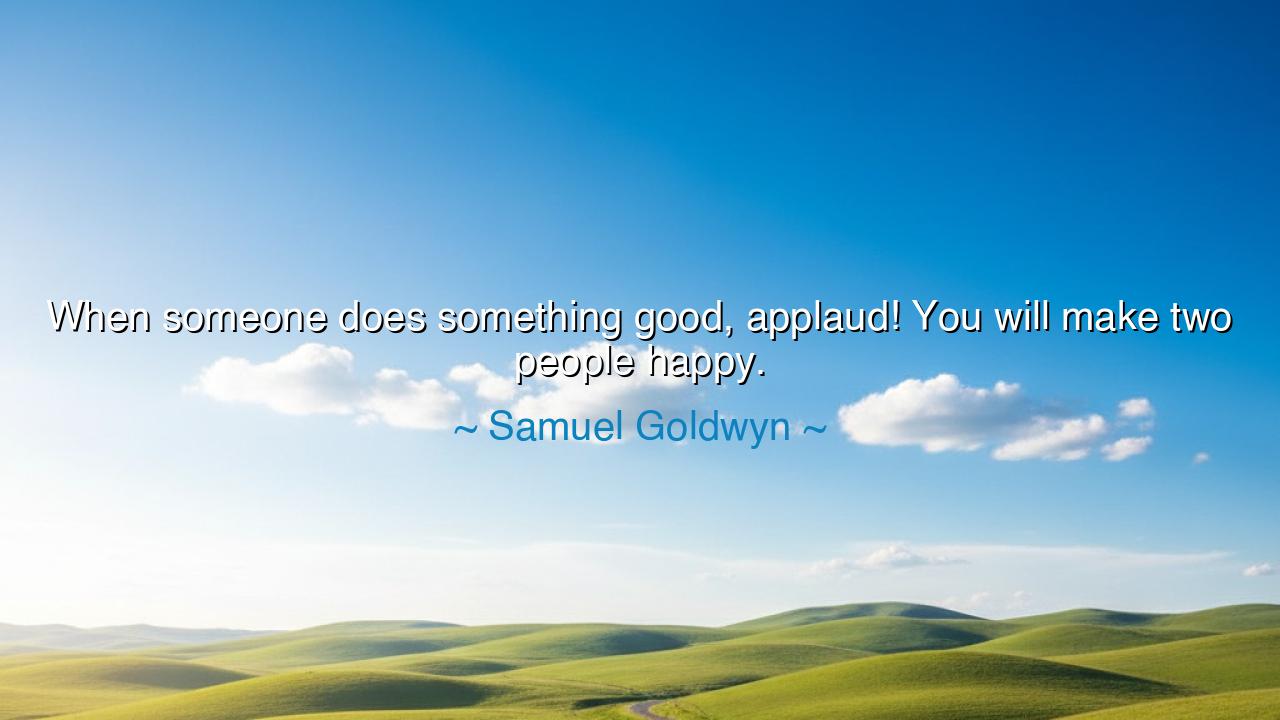
When someone does something good, applaud! You will make two






Hear, O children of kindness, the words of Samuel Goldwyn, who declared: “When someone does something good, applaud! You will make two people happy.” Though the words appear simple, they carry the weight of eternal wisdom. For to applaud is not merely to clap one’s hands—it is to acknowledge the effort of another, to honor goodness when it appears, and to sow joy in both giver and receiver. By recognizing the noble act, we magnify its power, and in that moment, two hearts are uplifted: the one who acted, and the one who rejoiced in the action.
The meaning of this teaching lies in the sacred exchange between encouragement and gratitude. Too often, men and women pass over good deeds in silence, noticing only faults or failures. Yet Goldwyn reminds us that goodness, when seen, must be celebrated. For applause is not wasted—it affirms the worth of the doer and strengthens the spirit of the observer. The one who applauds feels joy for having witnessed what is right; the one who is applauded feels inspired to continue in goodness. Thus, in a single act of recognition, two souls are made happy.
The origin of these words rests in Goldwyn’s own life as a pioneer of film, where applause was not only the sound of success but also the music of encouragement. In the theater and cinema, applause binds performer and audience together in a shared celebration of beauty and achievement. Yet Goldwyn saw that this principle belongs not only to the stage but to life itself: wherever virtue is revealed, recognition is its proper reward. In such recognition lies the power to encourage more goodness.
Consider the story of Booker T. Washington, who rose from slavery to become a great educator and leader. In his long journey, he met with scorn and resistance, but he also found encouragement from those who recognized his efforts. Every word of applause, every voice that honored his achievements, gave him strength to continue building schools, lifting communities, and transforming lives. Without those affirmations, his task might have seemed unbearable. Applause became both fuel and comfort.
Think also of Mother Teresa, who labored in the slums of Calcutta. Many mocked her for attempting the impossible. Yet there were also those who applauded her work, offering recognition, resources, and moral support. These voices of encouragement made two people happy: the saint, who felt renewed strength, and the encouragers themselves, who rejoiced in seeing goodness flourish through their acknowledgment. Their applause echoed into eternity, magnifying her mission.
O seekers of tomorrow, learn this: goodness thrives when celebrated. A child who is applauded for honesty will grow in truth. A worker who is recognized for diligence will labor with greater joy. A friend who is thanked for kindness will continue to give. To withhold applause is to starve the soul; to give it freely is to nourish both others and yourself. The echo of your recognition lingers, inspiring courage long after the moment has passed.
Practical wisdom calls you: do not let good deeds pass in silence. When you see courage, say so. When you witness kindness, honor it. When someone rises above despair to do what is right, applaud with word or gesture. Your recognition need not be grand; even a smile, a nod, or a word of praise can lift the spirit. In doing so, you weave joy into the fabric of life, and you will find your own heart lifted alongside the one you encourage.
Therefore, remember Goldwyn’s teaching: “When someone does something good, applaud! You will make two people happy.” Make it your daily practice. Become a bearer of encouragement, a sower of joy, a celebrant of goodness. For in lifting others, you too will be lifted. In honoring virtue, you too will be ennobled. And in every applause, however small, you will create a double blessing—one for your neighbor, and one for your own soul.
––






HLChu ha linh
This statement sparks curiosity about the psychological impact of acknowledgment. Why does applauding someone else make the giver happy as well? Is it empathy, social bonding, or a reinforcement of positive behavior? I also consider cultural differences: does this effect hold universally, or do social norms influence how appreciation is received and experienced? Finally, could incorporating this approach into daily life improve relationships, teamwork, and general morale?
LNThanh Le Nguyen
I appreciate the optimism in this statement, yet it raises questions about motivation. Does recognizing someone else’s actions encourage intrinsic motivation, or could it unintentionally create dependence on external validation? I also ponder whether this approach works equally well in competitive environments where praise might breed jealousy or comparison. How can we ensure that applause fosters happiness without unintended consequences?
PLPham Linh
Reading this, I feel inspired to be more intentional about celebrating others’ achievements. Could this principle apply beyond obvious successes to subtle acts of kindness or effort? I also wonder if consistently acknowledging good deeds can transform a group or community culture. Finally, how do we balance genuine applause with sincerity, ensuring that recognition is meaningful rather than routine or superficial?
AVNguyen pham Anh vu
This quote makes me think about the ripple effect of recognition. I wonder if small gestures of appreciation can truly impact both the giver and receiver consistently. How can we cultivate a habit of applauding others in everyday life without it feeling forced or performative? I also question whether public recognition is always better than private acknowledgment, and how context changes the emotional effect of praise.